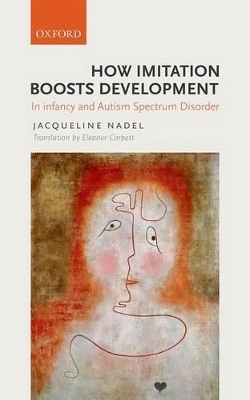
How Imitation Boosts Development
In Infancy and Autism Spectrum Disorder
Seiten
2014
Oxford University Press (Verlag)
978-0-19-870400-3 (ISBN)
Oxford University Press (Verlag)
978-0-19-870400-3 (ISBN)
Why are humans able to imitate - from the very second they enter the world? In this book, a leading development psychologist explores the topic of imitation - looking at why we imitate and the possible benefits it might bring - in particular to those affected by Autism Spectrum Disorders. The book offers fascinating insights into a neglected topic.
It was Plato who famously stated that 'imitation is dangerous because it stifles creativity, hampers the development of personal identity and disrupts the perception of other people as unique beings'. There are some who still feel this way, and perhaps this explains why imitation has received less attention within the developmental literature than other human characteristics. So why are humans able to imitate - from the very second they enter the world? Can it have positive effects? Can it help us interact with others better? Can it even make us feel better about ourselves and our ability to influence and interact with the world around us?
In this book, a leading development psychologist explores the topic of imitation - looking at why we imitate and the possible benefits it might bring - in particular to those affected by Autism Spectrum Disorders. The book offers fascinating insights into an often neglected topic.
It was Plato who famously stated that 'imitation is dangerous because it stifles creativity, hampers the development of personal identity and disrupts the perception of other people as unique beings'. There are some who still feel this way, and perhaps this explains why imitation has received less attention within the developmental literature than other human characteristics. So why are humans able to imitate - from the very second they enter the world? Can it have positive effects? Can it help us interact with others better? Can it even make us feel better about ourselves and our ability to influence and interact with the world around us?
In this book, a leading development psychologist explores the topic of imitation - looking at why we imitate and the possible benefits it might bring - in particular to those affected by Autism Spectrum Disorders. The book offers fascinating insights into an often neglected topic.
Jacqueline Nadel, Research Director, Centre national de la recherche scientifique, France
List of illustrations ; 1. Introduction: Imitation: the black sheep in the study of development ; 2. A little reminder ; 3. What imitation means ; 4. Imitation and development ; 5. What is imitation for? ; 6. What imitation can do for the infant ; 7. What can imitation do for children with autism? ; 8. The toolbox of imitation ; 9. Evaluating imitation in autism ; 10. Imitation - the overseer of development ; 11. Conclusion: Imitation: a contribution to an individual history of actions ; Glossary ; Bibliography ; Index
| Erscheint lt. Verlag | 31.7.2014 |
|---|---|
| Übersetzer | Eleanor Corbett |
| Verlagsort | Oxford |
| Sprache | englisch |
| Maße | 134 x 215 mm |
| Gewicht | 334 g |
| Themenwelt | Geisteswissenschaften ► Psychologie ► Entwicklungspsychologie |
| Geisteswissenschaften ► Psychologie ► Klinische Psychologie | |
| Geisteswissenschaften ► Psychologie ► Pädagogische Psychologie | |
| Geisteswissenschaften ► Psychologie ► Verhaltenstherapie | |
| Naturwissenschaften ► Biologie ► Humanbiologie | |
| Naturwissenschaften ► Biologie ► Zoologie | |
| ISBN-10 | 0-19-870400-3 / 0198704003 |
| ISBN-13 | 978-0-19-870400-3 / 9780198704003 |
| Zustand | Neuware |
| Informationen gemäß Produktsicherheitsverordnung (GPSR) | |
| Haben Sie eine Frage zum Produkt? |
Mehr entdecken
aus dem Bereich
aus dem Bereich
Vormals Oerter & Montada
Buch | Hardcover (2018)
Julius Beltz GmbH & Co. KG (Verlag)
CHF 89,60
Grundlagen, Diagnostik und Therapie vom Säuglingsalter bis zum alten …
Buch | Hardcover (2022)
Klett-Cotta (Verlag)
CHF 68,60
Deutsche Auflage unter Mitarbeit von Sabina Pauen
Buch (2022)
Springer (Verlag)
CHF 83,95


